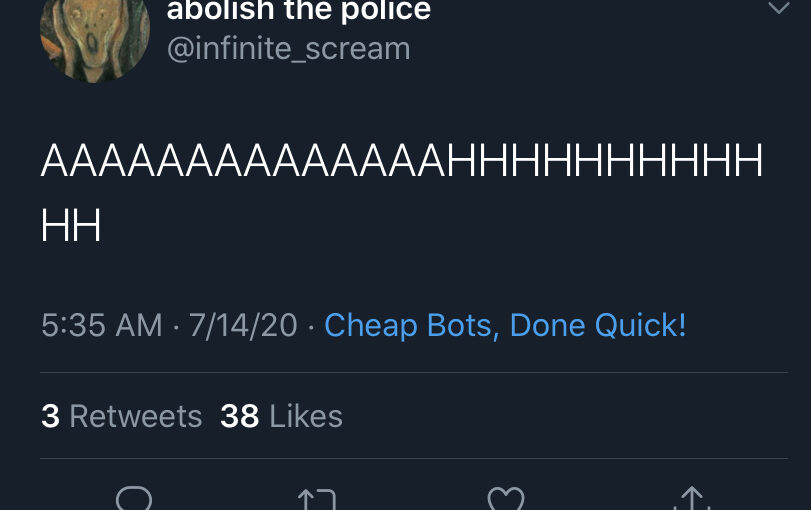Apologies for my German here, but I am verdammt scared and verflucht angry. We could have spent the summer ramping up our online teaching skills (and some of us have), and institutions could have spent extra resources to support professional development (and professional developers) for that purpose. And now, as it is still not safe to open classrooms to dozens of students at a time, we could do what’s best for the health of all and learn online. Instead, institutions have spent money on plexiglass shields and cameras for classrooms that will host shitty not-so-ideal masked and face-shielded “teaching” behind plexiglass, with students sitting at appropriate distance from each other, in the flow of aerosolized air that’s hopefully well filtered by whatever air conditioning system the institution can afford. Some institutions have already bitten the bullet and are making the emergency shift to online 2.0, others are holding out.
And I am not sure it didn’t have to be like this, given the current political and economic environment. I actually do think that administrators, as well as faculty, are trying to do the best they can. They’ve probably all had the hardest summer of their career, hands down. They’re good people, trying to do the right thing. And many will likely get people killed.
What got us into this mess? I do think it has something to do with what our institutions of higher education try to achieve, their purposes. And these purposes clash. Now, I am going a bit out on a limb here, honestly. I am not a scholar of higher education, and I am sure that my thoughts would be more sophisticated and less naive after an immersion in the relevant literature, though I’ve read a bit—Cathy Davidson’s The New Education comes to mind. Apologies to all scholars who find me awfully uninformed. But it’s my blog, and I can cry if I want to.
So, in my not-to-deeply-read naïveté (thanks, autocorrect, for the fancy spelling!), the contradictory purposes of colleges: Why not call them learning, assisted living, and elite formation? And in the current crisis they’re clashing. The phantasy of assisted living and the reality of elite formation are winning over learning at many institutions right now.
What I personally found attractive when I got involved in academia was the intense focus and depth of intellectual exploration: the long days in the library, the debates over the operationalization of variables, the close reading of texts, that sort of thing. In this sense, universities are biotopes for scholars. But also for less advanced learners: Universities offer the opportunity for young (and older) people to encounter different disciplines, ways of thinking, and—going beyond mere thinking towards affect and auto-motor work—different approaches to live, the universe, and everything. You may get trained as a dietician, but you’ll also have the honor of taking my introduction to US government, or a physics lab, and you may take an exercise class and become part of a club that organizes facilitated discussions…
This gets me to the second aspect of university life, as a residential institution for undergraduates. True, not all students are in their late teens and early twenties, but many are, and not all undergrads live on campus, but even those who do not live in dorms are usually pulled into structures and processes that regulate their lives. In an extreme case, many universities and colleges become half-way houses or assisted living facilities for adolescents: They leave home, usually for good, but receive assistance as they learn how to live on their own, how to make friends, handle conflicts, and so on.
I know, it’s tempting to leave it at a few snarky comments about institutions’ emphasis on dorms and cafeterias and landscaping. But, honestly, there’s much potential for learning going on. Students may spend 15-20 hours in the classroom per week, but many are on campus 24/7, and residence assistants, club advisors, psychological counselors, writing center faculty, and other student affairs professionals become their teachers. Plus, you learn a whole lot simply by interacting with others who have different backgrounds than you, come from different places, take different classes, and the like—especially if you live in the same dorm. (Of course, on-campus living comes with a list of side effects, such as the risk of alcohol abuse and sexual assault that many institutions struggle with.)
I am not sure that learning is the rationale (or only rationale) of on-campus living, though. For many middle-to-upper class families, college has become a way to shush the kids out of the house once they turn 18ish: They don’t really have to live on their own yet, they are taken care of, but they’re out of the house and placed on a class-appropriate trajectory. And they may learn something along the way. On-campus living has become a major source of income for universities, particularly with government support drying up. For many schools, beautiful campuses and fun activities are more important to attract students than academic quality.
Third, institutions of higher learning are places that form and reproduce elites, through selection but also through network formation and acculturation. The type of institution from which you get your degree shapes your social and professional success. Just getting into an Ivy or Oxbridge signals that you are either really smart or really upper-class. And the institutions reproduce elites, as they create a social environment of mostly elite adolescents. Going to college with the “right” crowd helps you form life-long relationships and networks with people of the “right” class. It’s not surprising that the most influential type of affirmative action in college admission is the preference for the children of alumni. That’s how status is reproduced.
Elite formation, or at least status maintenance, is not only pursued by elite institutions. Different institutions cater to different social groups, strata. There are upper middle class institutions, predominantly white institutions, etc. etc. Preference for “legacy admissions” maintains the social identity. And many institutions are divided over this goal (or maybe it’s only a practice): The demographic future of the country is not white-upper-middle-class; members of social elites are not necessarily as intellectually promising and academically dynamic as students from social backgrounds that are not traditional to an institution. And, of course, many faculty and higher-education professionals care deeply about social change: They want to provide opportunity to people who do not belong to the upper and upper-middle classes, to members of minoritized and oppressed groups. They enjoy the intellectual richness of a truly diverse student (and faculty) community. But the elites pay the bills.
I’d like institutions of higher learning to focus on learning, intellectual pursuits, deep investigation, important problem solving, formation of whole persons, etc. etc. But often these goals clash with the need to fill dorm rooms and to cater to “legacies.” Why? Higher education has been essentially privatized with declining state support. On-campus living and dining has become a major expense that needs to be paid; the school spirit that legacy parents teach their children helps fill the dorms and cafeterias. And this, in turn, provides jobs for a whole range of white and blue color workers: janitors, cooks, groundskeepers, and so on.
And now we’re stuck. If we do the educationally (and medically) right thing and go online, we lose the income that’s needed to maintain the physical university spaces. And the government won’t provide the finances to hold us over for the year as higher education is viewed as a private interest, not the public good* that it in fact is. If we do the educationally (and medically) right thing, scores of workers will lose their jobs and health insurance as dorms and cafeterias are closed. And the government does not provide the welfare and health care support that would be needed to help those workers survive another year until campus can be opened again.
It has become a truism to say that the current crisis has brought a number of social problems to a head. Like all truisms, there is some truth in this one. The current crisis shows how unsustainable our social system has become, how inept our political system has become, but also how unsustainable the current business model of many institutions of higher education has become. Higher education has to be recognized for the public benefits it provides: an innovative, civically engaged public, a dynamic economy, employment for local communities, spaces for people to come together and learn from each other, and more. If we want to maintain those benefits, we’ll have to change the business model.
*Yeah, yeah, public choice folks: Technically, universities aren’t public goods because people can be excluded from them. So, club goods for most. But they also produce tons of positive externalities, and those can be truly public goods (ever heard of the internet?).


